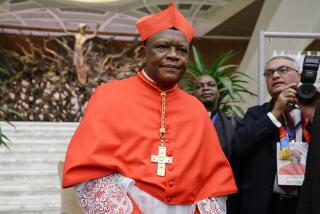RELIGION CATHOLICS : Bishops’ Panel Rejects Condoms in AIDS Battle
- Share via
Countering a controversial earlier position, a committee of Roman Catholic bishops Thursday issued a draft of a new policy paper on the AIDS crisis that strongly rejects any use of condoms to prevent the spread of the fatal disease.
The document, which claims that sexual abstinence outside marriage is the only moral and practical solution, also condemns programs in which sterile needles are dispersed to drug addicts to lessen the risk of infection by sharing contaminated ones.
Los Angeles Archbishop Roger M. Mahony, who chairs the five-member committee, was one of several bishops who had objected to the earlier statement that gave implicit permission to church hospitals and agencies to provide information on condoms as a potential safeguard against AIDS.
Mahony called the first statement “terribly confusing” to Catholics. Compromising on Catholic teaching in order to be more influential in public policy “has never been our role. Even to start down that road is fraught with difficulties,” he said.
Soon after the first statement was approved by the U.S. bishops’ 50-member administrative board in December, 1987, Cardinal Joseph Ratzinger, head of the Vatican Congregation for the Doctrine of the Faith, joined in the criticism and admonished the U.S. bishops for not consulting with Rome.
Mahony, adapting the statement for his own archdiocese, revised five sentences to flatly prohibit the endorsement of public health recommendations on condoms.
The nation’s 300 bishops reached a compromise at a June, 1988, national meeting by letting stand the 1987 AIDS statement, while at the same time commissioning a second, possibly broader, statement.
The new draft was commissioned “to carry the discussion further and . . . have behind it the weight of the entire American hierarchy,” Bill Ryan, a spokesman for the National Conference of Catholic Bishops in Washington, said Thursday.
The 68-page statement, “Called to Compassion: A Response to the HIV/AIDS Crisis,” is likely to be approved by the full body of bishops next month. HIV is the virus that causes AIDS.
“HIV/AIDS must be opposed with education, counseling and persuasion,” the new document said. But it charged that promoting condom use is a “quick-fix tactic” doomed to failure in the long run.” Although some studies have shown condoms are not a foolproof method of preventing infection, health officials advocate their use as one way of stemming the spread of AIDS.
“The safe-sex approach to preventing HIV/AIDS, though frequently advocated, compromises human sexuality and can lead to promiscuous sexual behavior,” the document said. “Not only is the use of prophylactics in an attempt to halt the spread of HIV technically unreliable; promoting this approach means, in effect, promoting behavior which is morally unacceptable.
“We fault these programs for another reason as well. Recognizing that casual sex is a risk to health, (these programs) consistently advise the use of condoms in order to eliminate the risk. This is poor and inadequate advice.”
The official Catholic teaching against using contraceptive devices--even within marriage--is disregarded by a large majority of the nation’s Catholics, according to the preponderance of surveys taken during the last two decades.
And the Catholic prohibition against using condoms to stem the AIDS epidemic runs counter to the policies of most mainline Protestant churches and Jewish agencies, which generally follow recommendations by the U.S. surgeon general’s office.
The Rev. Albert Ogle, an Episcopal priest who directs the All Saints AIDS Service Center in Pasadena, criticized the new bishops’ statement for “not addressing what is really happening in their communities.”
“The reality,” Ogle said, “is that young people in our parishes are being infected by the virus and will get sick and die and infect others because the church has painted itself in a corner over birth control. . . . The (Catholic) Church is killing young people and that is not a pro-life stance.”
Ogle said he had worked with Mahony in founding the Interfaith AIDS Council of Southern California. He said he believes the Catholic Church could prevent the spread of AIDS in the Hispanic community, which is heavily Catholic, by realistically addressing the problem. “I believe there is moral judgment upon the church not to respond to that challenge,” Ogle said.
Retired United Methodist Bishop Melvin Wheatley called it “totally irrational” to think that providing condoms to people who are sexually active will undermine the church’s teachings on abstinence. Wheatley of Laguna Hills will be the featured speaker Oct. 27 at a conference of the AIDS Interfaith Council of Southern California.
Catholic Auxiliary Bishop Carl A. Fisher of Los Angeles said he hoped that the new statement will not totally negate the previous one.
Fisher was among a number of bishops who had said they supported the earlier policy statement that Catholics could pass on information, such as that provided by the U.S. Public Health Service about condoms, “to persons who were not Catholic or not inclined to alter their conduct or actions” in spite of church teachings.
Fisher said he felt the first statement was “a profound one” and realistically faced situations encountered by Catholics involved in counseling people in danger of contracting the disease.
“I work in the Long Beach area with persons who are dying from AIDS in some nine hospices,” Fisher said. “I do not believe that withholding information . . . is going to help in the curtailment in the spread of AIDS.”
The wide-ranging new draft also opposes universal mandatory AIDS testing, calls for increasing federal funds for AIDS research and denounces violence and discrimination against AIDS victims as immoral.
Needle exchange programs, in which drug abusers trade used needles for free new, clean ones--because infected needles are considered to be a major means of transmitting AIDS--are attacked in the document on grounds that “more drug use might result while fewer intravenous drug users sought treatment.”
“Distribution of free needles and syringes would send the message that intravenous drug use can be made safe,” the statement added.
In a passage directed at public policy-makers, the draft goes on to call for legislation that includes “helping to prevent the transmission of HIV, providing adequate medical care and protecting civil rights,” including a ban on discrimination in employment, schooling, entertainment, business opportunities, housing and medical care.
“Compassion--love--toward persons infected with HIV is the only authentic response,” the statement said. “Persons with AIDS are not distant, unfamiliar people, the objects of our mingled pity and aversion. We must keep them present to our consciousness, as individuals and a community and embrace them with unconditional love.”
In addition to Mahony, others on the drafting committee are Cardinal Joseph L. Bernardin of Chicago, Cardinal Bernard F. Law of Boston, Archbishop William H. Keeler of Baltimore and Bishop Raymond W. Lessard of Savannah, Ga.
NEXT STEP
If approved next month, the Catholic bishops’ statement on AIDS will become a policy guideline for the nation’s 55 million Catholics. Catholic hospitals, schools, social service agencies, priests and church workers will be expected to use it to convey church teachings on AIDS.
More to Read
Sign up for Essential California
The most important California stories and recommendations in your inbox every morning.
You may occasionally receive promotional content from the Los Angeles Times.













